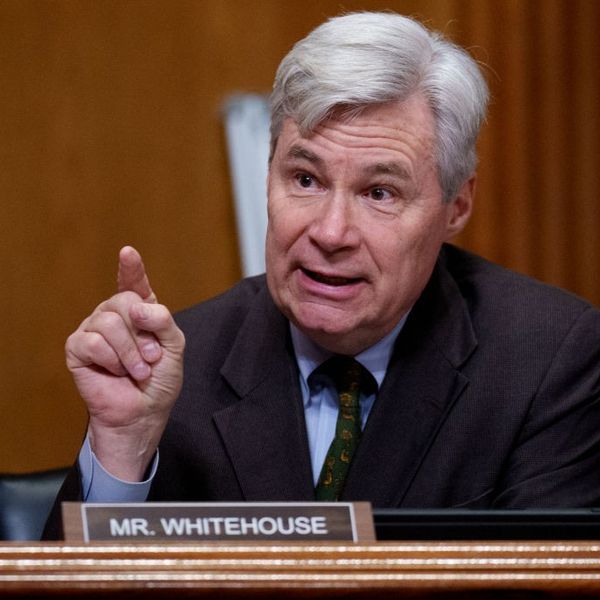GOP Lawmakers Plan Their Attack Against NY Fracking Ban
One month after landmark ban, Congress is likely to pursue 'property rights' argument to deflate regulatory action
Just one month after New York's landmark fracking ban was announced, amid ongoing celebrations and calls for other states to follow suit, Republican lawmakers are already scheming on how best to override the decision.
The Poughkeepsie Journal reported Sunday that at least one Republican congressman is considering ways to make it easier for landowners to sue the state.
Fracking advocate and U.S. Rep. Chris Collins (R-NY), who was recently named to the House Energy and Commerce Committee, told the Journal that he has "engaged in a series of discussions on the next steps needed to help restore the individual property rights of New Yorkers."
Landowners already have a recourse, known as a "takings claim," through which they can argue that they have "no reasonable use for their property as a result of the government's action" and that the government is obliged to compensate for their losses. At issue is whether the fracking ban would apply in this context.
Tom West, an attorney who has represented oil and gas companies in fracking cases, told the Journal that lawmakers are "potentially" considering legislation that would make it easier for landowners to bring such a claim and, further, make their case in federal court, as opposed to state court--where a takings claim would face stronger opposition.
Though such action may not challenge the fracking ban outright, West notes, "if you have the prospect of having to pay out hundreds of millions--or billions--of dollars to landowners as a result of your regulatory action, you might rethink your strategy."
The attack is not unexpected. When announcing the ban, New York Governor Andrew Cuomo said that decision would likely face "tons" of lawsuits.
Supporters of the fracking ban are planning a rally in Albany this Wednesday to celebrate what they say is an "incredible victory for science, public health, the environment, and our movement." Over one hundred local and national organizations are sponsoring the event.
An Urgent Message From Our Co-Founder
Dear Common Dreams reader, The U.S. is on a fast track to authoritarianism like nothing I've ever seen. Meanwhile, corporate news outlets are utterly capitulating to Trump, twisting their coverage to avoid drawing his ire while lining up to stuff cash in his pockets. That's why I believe that Common Dreams is doing the best and most consequential reporting that we've ever done. Our small but mighty team is a progressive reporting powerhouse, covering the news every day that the corporate media never will. Our mission has always been simple: To inform. To inspire. And to ignite change for the common good. Now here's the key piece that I want all our readers to understand: None of this would be possible without your financial support. That's not just some fundraising cliche. It's the absolute and literal truth. We don't accept corporate advertising and never will. We don't have a paywall because we don't think people should be blocked from critical news based on their ability to pay. Everything we do is funded by the donations of readers like you. Will you donate now to help power the nonprofit, independent reporting of Common Dreams? Thank you for being a vital member of our community. Together, we can keep independent journalism alive when it’s needed most. - Craig Brown, Co-founder |
Just one month after New York's landmark fracking ban was announced, amid ongoing celebrations and calls for other states to follow suit, Republican lawmakers are already scheming on how best to override the decision.
The Poughkeepsie Journal reported Sunday that at least one Republican congressman is considering ways to make it easier for landowners to sue the state.
Fracking advocate and U.S. Rep. Chris Collins (R-NY), who was recently named to the House Energy and Commerce Committee, told the Journal that he has "engaged in a series of discussions on the next steps needed to help restore the individual property rights of New Yorkers."
Landowners already have a recourse, known as a "takings claim," through which they can argue that they have "no reasonable use for their property as a result of the government's action" and that the government is obliged to compensate for their losses. At issue is whether the fracking ban would apply in this context.
Tom West, an attorney who has represented oil and gas companies in fracking cases, told the Journal that lawmakers are "potentially" considering legislation that would make it easier for landowners to bring such a claim and, further, make their case in federal court, as opposed to state court--where a takings claim would face stronger opposition.
Though such action may not challenge the fracking ban outright, West notes, "if you have the prospect of having to pay out hundreds of millions--or billions--of dollars to landowners as a result of your regulatory action, you might rethink your strategy."
The attack is not unexpected. When announcing the ban, New York Governor Andrew Cuomo said that decision would likely face "tons" of lawsuits.
Supporters of the fracking ban are planning a rally in Albany this Wednesday to celebrate what they say is an "incredible victory for science, public health, the environment, and our movement." Over one hundred local and national organizations are sponsoring the event.
Just one month after New York's landmark fracking ban was announced, amid ongoing celebrations and calls for other states to follow suit, Republican lawmakers are already scheming on how best to override the decision.
The Poughkeepsie Journal reported Sunday that at least one Republican congressman is considering ways to make it easier for landowners to sue the state.
Fracking advocate and U.S. Rep. Chris Collins (R-NY), who was recently named to the House Energy and Commerce Committee, told the Journal that he has "engaged in a series of discussions on the next steps needed to help restore the individual property rights of New Yorkers."
Landowners already have a recourse, known as a "takings claim," through which they can argue that they have "no reasonable use for their property as a result of the government's action" and that the government is obliged to compensate for their losses. At issue is whether the fracking ban would apply in this context.
Tom West, an attorney who has represented oil and gas companies in fracking cases, told the Journal that lawmakers are "potentially" considering legislation that would make it easier for landowners to bring such a claim and, further, make their case in federal court, as opposed to state court--where a takings claim would face stronger opposition.
Though such action may not challenge the fracking ban outright, West notes, "if you have the prospect of having to pay out hundreds of millions--or billions--of dollars to landowners as a result of your regulatory action, you might rethink your strategy."
The attack is not unexpected. When announcing the ban, New York Governor Andrew Cuomo said that decision would likely face "tons" of lawsuits.
Supporters of the fracking ban are planning a rally in Albany this Wednesday to celebrate what they say is an "incredible victory for science, public health, the environment, and our movement." Over one hundred local and national organizations are sponsoring the event.

